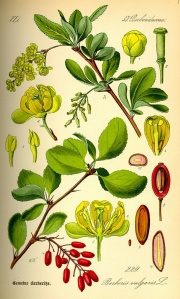Berberine sulfate
Jump to navigation
Jump to search
Description
Yellow needle crystals obtained from the roots of the barberry (Berberis vulgaris) or goldenseal (Hydrastis canadensis) plants. Berberine sulfate is used as a Fluorochrome for biological staining where it has a mean excitation wavelength of 430 nm (violet/blue) and a mean emission wavelength of 550 nm (Wolbers et al., 1990).
Synonyms and Related Terms
berberine sulphate (Br.); barberry (Berberis vulgaris); goldenseal (Hydrastis canadensis)
Risks
Toxic by ingestion, inhalation and skin absorption.
Physical and Chemical Properties
Soluble in ethanol. Slightly soluble in water.
| Composition | (C20H18NO4)2-SO4-3H2O |
|---|
Resources and Citations
- Richard S. Lewis, Hawley's Condensed Chemical Dictionary, Van Nostrand Reinhold, New York, 10th ed., 1993
- Richard C. Wolbers, Nanette T. Sterman, Chris Stavroudis, Notes for Workshop on New Methods in the Cleaning of Paintings, J.Paul Getty Trust, Los Angeles, 1990
- The Merck Index, Martha Windholz (ed.), Merck Research Labs, Rahway NJ, 10th edition, 1983 Comment: entry 1192
